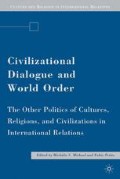Abstract
If the purpose of dialogue is to promote reconciliation and harmony, or at least reduce hostility, then clearly dialogue must ofcus on the very issues that divide. One of the major issues that divide is the way the past is remembered. Differences over history constitute a major aspect of the divisions between peoples, societies, and civilizations. This chapter argues that, in light of the significance it has in the divisions between peoples, dialogue on historical memory must be seen as an important ofcus area ofr a dialogue of civilizations.
Access this chapter
Tax calculation will be finalised at checkout
Purchases are for personal use only
Preview
Unable to display preview. Download preview PDF.
Notes
Gordon D. Kaufman (1987) “Religious Diversity, Historical Consciousness, and Christian Theology,” in John Hick and Paul Knitter (eds.), The Myth of Christian Uniqueness (Maryknoll, NY: Orbis Books), 14.
Michael Walzer (1977) Just and Unjust Wars: A Moral Argument with Historical Illustrations (New York: Basic Books), 138–143.
Elazar Barkan (2000) The Guilt of Nations: Restitution and Negotiating Historical Injustices (New York: W. W. Norton and Company), x.
Stuart MacIntyre and Anna Clark (2003) The History Wars (Melbourne: Melbourne University Press), 201.
Sargent Bush (2000) “America’s Origin Myth: Remembering Plymouth Rock,” American Literary History 12 (4), 746.
Charles S. Maier (2000) “Doing History, Doing Justice: The Narratives of the Historian and of the Truth Commission,” in Robert I. Rotberg and Dennis Thompson (eds.), Truth v. Justice: The Morality of Truth Commissions (Princeton: Princeton University Press), 272.
Jacques Dupuis (1991) Jesus Christ at the Encounter of the World Religions (Maryknoll, NY: Orbis Books), 233.
Jakob Kavunkal (1989) “Dialogue: On Conversion,” in Leonardo N. Mercado and James J. Knight (eds.) Mission and Dialogue: Theory and Practice (Manila: Divine Word Publications), 122.
David J. Bosch (1993) Transofrming Mission: Paradigm Shifts in Theology of Mission (Maryknoll, NY: Orbis Books), 484.
Norman C. Habel (1999) Reconciliation: Searching ofr Australia’s Soul (Sydney: HarperCollins Publishers), 34. A brief description of the story of this massacre can be ofund on the Flinders University homepage at http://www.flinders.edu.au/news/articles/?fji4vi2so3 (accessed April 23, 2008).
See, ofr example, Naoko Shimazu (1998) Japan, Race, and Equality: The Racial Equality Proposal of 1919 (London: Routledge).
Christopher Thorne (1985) The Issue of War: States, Societies and the Far Eastern Conflict of 1941–1945 (New York: Oxofrd University Press), 127.
Niall Ferguson (2006) The War of the World: Twentieth-Century and the Descent of the West (New York: The Penguin Press), 212–220.
Editor information
Editors and Affiliations
Copyright information
© 2009 Michális S. Michael and Fabio Petito
About this chapter
Cite this chapter
Seigel, M.T. (2009). History, Memory, and the Dialogue of Civilizations: The Case of Northeast Asia. In: Michael, M.S., Petito, F. (eds) Civilizational Dialogue and World Order. Culture and Religion in International Relations. Palgrave Macmillan, New York. https://doi.org/10.1057/9780230621602_13
Download citation
DOI: https://doi.org/10.1057/9780230621602_13
Publisher Name: Palgrave Macmillan, New York
Print ISBN: 978-1-349-37494-6
Online ISBN: 978-0-230-62160-2
eBook Packages: Palgrave Political & Intern. Studies CollectionPolitical Science and International Studies (R0)

